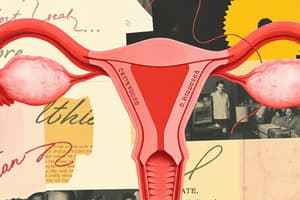Podcast
Questions and Answers
What is the purpose of the menstrual phase in the menstrual cycle?
What is the purpose of the menstrual phase in the menstrual cycle?
Shedding of the endometrium if no fertilization has occurred
Describe the events that occur during the follicular phase of the menstrual cycle.
Describe the events that occur during the follicular phase of the menstrual cycle.
Growth of ovarian follicles containing eggs and production of estrogen
What happens during ovulation in the menstrual cycle?
What happens during ovulation in the menstrual cycle?
Release of a mature egg from the ovary
When does ovulation typically occur in the menstrual cycle?
When does ovulation typically occur in the menstrual cycle?
What is the main purpose of the menstrual cycle in women capable of bearing children?
What is the main purpose of the menstrual cycle in women capable of bearing children?
What hormone is responsible for stimulating the growth and maturation of ovarian follicles?
What hormone is responsible for stimulating the growth and maturation of ovarian follicles?
Which hormone triggers ovulation by causing the release of a mature egg from the ovary?
Which hormone triggers ovulation by causing the release of a mature egg from the ovary?
What is the role of estrogen in the menstrual cycle?
What is the role of estrogen in the menstrual cycle?
During which phase of the menstrual cycle does the corpus luteum produce progesterone?
During which phase of the menstrual cycle does the corpus luteum produce progesterone?
Name a factor that can influence the length and regularity of the menstrual cycle related to physical health.
Name a factor that can influence the length and regularity of the menstrual cycle related to physical health.
Flashcards are hidden until you start studying
Study Notes
Understanding the Female Reproductive System: Menstrual Cycle Overview
The female reproductive system is a complex and remarkable organism, designed to support life and maintain a steady balance of hormones for health and fertility. At the core of this system is the menstrual cycle, a monthly event that occurs in women capable of bearing children, also known as menstruators.
The Menstrual Cycle
The menstrual cycle is a series of events involving the ovaries, uterus, and hormones that prepare the body for potential pregnancy. It consists of two phases: the menstrual phase and the follicular and luteal phases.
-
Menstrual Phase: This phase, also known as the bleeding phase, begins with menstruation and lasts from 3 to 7 days. During menstruation, the lining of the uterus, the endometrium, is shed if no fertilization has occurred.
-
Follicular Phase: This phase, lasting approximately 14 days, starts with the shedding of the endometrium and ends when a mature egg is released from the ovary. The follicular phase is characterized by the growth of a group of ovarian follicles containing eggs, and the production of estrogen by these follicles.
-
Ovulation: During ovulation, a single mature egg is released from the ovary (usually from the right ovary) and travels through the fallopian tube to potentially meet a sperm for fertilization. Ovulation typically occurs around day 14 of the menstrual cycle.
-
Luteal Phase: The luteal phase, lasting approximately 10 to 14 days, begins immediately after ovulation and ends with the preparation of the uterus for a potential pregnancy. During this phase, the remaining corpus luteum (the structure that housed the released egg) produces progesterone, which helps maintain the uterine lining.
Menstrual Cycle Hormones
The menstrual cycle is regulated by a complex interplay of hormones, which include:
-
Follicle-Stimulating Hormone (FSH): Produced by the pituitary gland, FSH stimulates the growth and maturation of ovarian follicles.
-
Luteinizing Hormone (LH): Produced by the pituitary gland, LH triggers ovulation by causing the release of a mature egg from the ovary. LH also stimulates the corpus luteum to produce progesterone during the luteal phase.
-
Estrogen: Produced by the ovaries, estrogen helps stimulate the growth and development of the uterine lining and supports the maturation of ovarian follicles.
-
Progesterone: Produced by the corpus luteum during the luteal phase, progesterone helps maintain the uterine lining and supports the early stages of pregnancy.
Factors Influencing the Menstrual Cycle
Several factors can influence the length and regularity of the menstrual cycle, including:
-
Age: Menstrual cycles typically become more stable and regular during the late teens and early 20s, and may become less consistent as women age.
-
Physical health: Conditions such as polycystic ovary syndrome (PCOS) and hypothyroidism can disrupt the menstrual cycle.
-
Stress: Chronic stress can disrupt the normal hormonal balance and alter the menstrual cycle.
-
Physical activity: Regular exercise can help to regulate the menstrual cycle, but excessive exercise can lead to irregularities.
-
Weight: Significant weight loss or gain can affect the menstrual cycle.
-
Diet: A diet lacking certain nutrients or high in certain foods can disrupt the menstrual cycle.
The menstrual cycle is a fascinating and complex process that demonstrates the intricate balance of hormones and tissues within the female reproductive system. Understanding the menstrual cycle is essential for women's health and well-being, especially when it comes to planning for pregnancy or managing reproductive health.
Studying That Suits You
Use AI to generate personalized quizzes and flashcards to suit your learning preferences.




